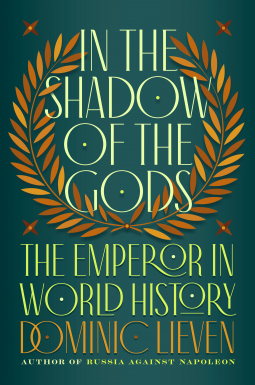
In the Shadow of the Gods
The Emperor in World History
by Dominic Lieven
This title was previously available on NetGalley and is now archived.
Buy on Amazon
Buy on BN.com
Buy on Bookshop.org
*This page contains affiliate links, so we may earn a small commission when you make a purchase through links on our site at no additional cost to you.
Send NetGalley books directly to your Kindle or Kindle app
1
To read on a Kindle or Kindle app, please add kindle@netgalley.com as an approved email address to receive files in your Amazon account. Click here for step-by-step instructions.
2
Also find your Kindle email address within your Amazon account, and enter it here.
Pub Date Jun 07 2022 | Archive Date Aug 07 2022
PENGUIN GROUP Viking | Viking
Talking about this book? Use #IntheShadowoftheGods #NetGalley. More hashtag tips!
Description
A dazzling account of the men (and occasional woman) who led the world’s empires, a book that probes the essence of leadership and power through the centuries and around the world.
From the rise of Sargon of Akkad, who in the third millennium BCE ruled what is now Iraq and Syria, to the collapse of the great European empires in the twentieth century, the empire has been the dominant form of power in history. Dominic Lieven’s expansive book explores strengths and failings of the human beings who held those empires together (or let them crumble). He projects the power, terror, magnificence, and confidence of imperial monarchy, tracking what they had in common as well as what made some rise to glory and others fail spectacularly, and at what price each destiny was reached.
Lieven’s characters—Constantine, Chinggis Khan, Trajan, Suleyman, Hadrian, Louis XIV, Maria Theresa, Peter the Great, Queen Victoria, and dozens more—come alive with color, energy, and detail: their upbringings, their loves, their crucial spouses, their dreadful children. They illustrate how politics and government are a gruelling business: a ruler needed stamina, mental and physical toughness, and self-confidence. He or she needed the sound judgement of problems and people which is partly innate but also the product of education and experience. A good brain was essential for setting priorities, weighing conflicting advice, and matching ends to needs. A diplomatically astute marriage was often even more essential.
Emperors (and the rare empresses) could be sacred symbols, warrior kings, political leaders, chief executive officers of the government machine, heads of a family, and impresarios directing the many elements of "soft power" essential to any regime’s survival. What was it like to live and work in such an extraordinary role? What qualities did it take to perform this role successfully? Lieven traces the shifting balance among these elements across eras that encompass a staggering array of events from the rise of the world’s great religions to the scientific revolution, the expansion of European empires across oceans, the great twentieth century conflicts, and the triumph of nationalism over imperialism.
The rule of the emperor may be over, but Lieven shows us how we live with its poltical and cultural legacies today.
From the rise of Sargon of Akkad, who in the third millennium BCE ruled what is now Iraq and Syria, to the collapse of the great European empires in the twentieth century, the empire has been the dominant form of power in history. Dominic Lieven’s expansive book explores strengths and failings of the human beings who held those empires together (or let them crumble). He projects the power, terror, magnificence, and confidence of imperial monarchy, tracking what they had in common as well as what made some rise to glory and others fail spectacularly, and at what price each destiny was reached.
Lieven’s characters—Constantine, Chinggis Khan, Trajan, Suleyman, Hadrian, Louis XIV, Maria Theresa, Peter the Great, Queen Victoria, and dozens more—come alive with color, energy, and detail: their upbringings, their loves, their crucial spouses, their dreadful children. They illustrate how politics and government are a gruelling business: a ruler needed stamina, mental and physical toughness, and self-confidence. He or she needed the sound judgement of problems and people which is partly innate but also the product of education and experience. A good brain was essential for setting priorities, weighing conflicting advice, and matching ends to needs. A diplomatically astute marriage was often even more essential.
Emperors (and the rare empresses) could be sacred symbols, warrior kings, political leaders, chief executive officers of the government machine, heads of a family, and impresarios directing the many elements of "soft power" essential to any regime’s survival. What was it like to live and work in such an extraordinary role? What qualities did it take to perform this role successfully? Lieven traces the shifting balance among these elements across eras that encompass a staggering array of events from the rise of the world’s great religions to the scientific revolution, the expansion of European empires across oceans, the great twentieth century conflicts, and the triumph of nationalism over imperialism.
The rule of the emperor may be over, but Lieven shows us how we live with its poltical and cultural legacies today.
Available Editions
| EDITION | Other Format |
| ISBN | 9780735222199 |
| PRICE | $40.00 (USD) |
| PAGES | 608 |



